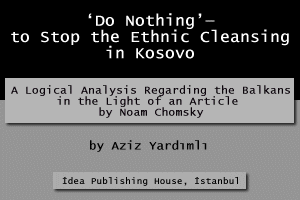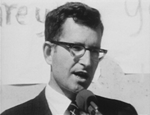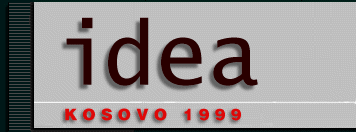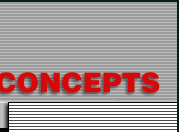|


|


Noam
Chomsky answers some queries about Moral Principles and International Law
(from a ‘bonus commentary,’ ZNet, May 9, 1999):
Question:
What's the basis of valid moral principles?
Answer:
I'm afraid the question is not a "genuine question." It is no more a "genuine
question" than such pseudo-questions as "why do things happen?"

Noam
Chomsky
1.
Intellectual and truth
In a ‘Preface’
to the French edition of Noam Chomsky's Powers and Prospects, Michael
Albert writes:
‘‘The
French edition of
Powers and Prospects revolves in considerable
part around that question, one that Chomsky is asked often. Chomsky generally
replies that an intellectual should tell the truth ‘as best one
can’ about ‘things that matter, to the right audience.’ He elaborates ‘the
responsibility of the writer as a moral agent is to try to bring
the truth about matters of human significance to an audience that
can do something about them.’ ’’
Truth
and
Morality
are
high words—even the highest, since we can not think of them apart from
other concepts like Justice, Freedom, Peace and Love. They certainly are
not supra-human things to be given up, or to be eternally hopeless for.
Their comprehension is their actualization. They are human abilities, or,
if we prefer, they are values which are our real being, just as
their opposites express only the absence of human quality.
Yet for many
it takes courage in these postmodernist/relativist days to speak of the
truth
and
morality,
conscience
and
justice.
And we see that in these painful days of war Mr. Chomsky talks a lot about
..., no, not about truths, but about half-truths. And, as we are going
to see their logical grounds, he does it quite consistently. That also
leaves his use of the word ‘morality’ meaningless—as he himself can give
the term no meaning
in the above quotation. Armed with half-truths,
it is still possible to induce the right audience to ‘do something.’ Yet
as long as justice needs full-truths, even half-lies can only harm it.
Justice itself is the full truth, the absolute truth of our existence.
The term ‘intellectual’
may have many meanings. And this simple fact has very disturbing implications.
Yet we have to be ready to accept the reality, the plasticity of
the term. By itself, the term ‘intellectual’ does not necessarily entail
the knowledge of the truth. Mr. Kissinger and Mr. Brzezinski both
are intellectuals in the proper sense of the term. So are Göbbels
and Sartre, for example, or Lenin and Mussolini, Marx and Bakunin, Nietzsche
and Popper. An intellectual may be existentialist or Nazi, communist or
fascist, socialist or anarchist, nihilist or positivist, materialist or
spiritualist. In fact, his or her consciousness is a battle ground for
the abstract concepts, open to the countless configurations of their connections,
determined in each case by a dominant one which arranges them into a more
or less consistent structure, that is, into an ideology.
Intellectualism
is not a matter only of speculation or pure theory. Quite the contrary,
intellectual proudly dismisses such ‘abstract’ attitudes which he opines
as indifferent to reality. It is not interested basically in non-practical
matters like mathematics or physics. Intellectualism is a matter of practical
significance.
To be intellectual is first of all to moralize.
 |
Jean-Paul
Sartre. He declared Marxism to be a version of humanism while according
to the founder, Karl Marx, the new ideology was in no way different in
its content from the earlier ‘utopian’ forms except involving a plus, a
‘scientific’ factor of violence and terror to attain its humanitarian goal. |
Yet since in
spite of his being an intellectual he too must use his natural reason to
work out his argumentations, judgments, and conclusion, it is not unlikely
that he too may err like anybody else.
But since he
has rejected and left behind his common sense by deconstructing his reason
into its abstract concepts without putting them back in their proper place
yet, the support of conventional wisdom misses him, and his logical errors
expose him to much greater moral risks than would otherwise have been the
case. So it is not unusual to see the intellectuals often going astray
while pursuing the logic of abstract/analytical ideas, and landing in immoralism
or even espousing despotism. Still there is nothing to prevent them from
being called intellectuals.
Or, an intellectual
may try to preserve a healthy soul capable to feel decently, so that he
may at least be right relative to common wisdom of the world. But to this
extent he risks relinquishing his quality of being an intellectual, grows
common, gets closer to Larry King. We never call a mathematician an intellectual
just because he is mathematician. It is same with the medical doctors,
physicists, chemists; and also with painters, poets, and philosophers.
Intellectualism has a certain practical concern that separates it
from the other activities of the intellect. In its moral quality, it exists
for the sake of amending the world.
But to whatever
audience he may present his services, in the capacity of mere intellectual
he or she is in no position to claim the truth for personal opinions
and convictions. Intellectualism is not enough. It is too loose a concept
to justify any claim to the truth. With its relativism and skepticism inherent
in it, it seems almost impossible to connect the term ‘intellectual’ with
the non-relative, i.e. absolutely certain truths. At best, it can be connected
with approximate truths, half-truths, and so if we believe in truth, that
is, full truth, intellectualism itself has only its unconscious role to
play in the drama of humanity, whatever important or unimportant that role
may be. Revolutionary intellectuals played big parts in their time and
culture—for better or worse. On the whole, they were simply toys in the
hands of the social processes working behind their back. They were totally
innocent of the the truth. Soon, their relative, temporary half-truths
turned out to be wrongs, grow stale, and were replaced by others, similar
to themselves.
 A
special class of materialist
intellectuals were born in the last
century in Europe. From the resources of their materialism, they
deduced a spirituality which was absolutely unrivaled in the annals
of history, a flawless morality which not only overshadowed that
of the prophets but declared them to be working in the service of evil
all along. They accursed the whole history as false, as an intrigue
of the ruling classes. They denied the whole philosophy as an appendix
to the superstition, the wise men as castle-builders. They were total in
anything. They claimed to be the true liberators of humanity from injustice.
They assumed a responsibility for history which was virtually divine. They
saw an absolute right in themselves to decide for every single person,
every single people, every single nation in the world, a power
to
control the total destiny of humanity. They had an ego-ideal never matched
in the blank centuries of the world history. They had a conscience so clear,
so pure, so spotless that with which it would never be a problem to resort
to violence, to punish, to annihilate—all without any shred of feeling
of guilt. A
special class of materialist
intellectuals were born in the last
century in Europe. From the resources of their materialism, they
deduced a spirituality which was absolutely unrivaled in the annals
of history, a flawless morality which not only overshadowed that
of the prophets but declared them to be working in the service of evil
all along. They accursed the whole history as false, as an intrigue
of the ruling classes. They denied the whole philosophy as an appendix
to the superstition, the wise men as castle-builders. They were total in
anything. They claimed to be the true liberators of humanity from injustice.
They assumed a responsibility for history which was virtually divine. They
saw an absolute right in themselves to decide for every single person,
every single people, every single nation in the world, a power
to
control the total destiny of humanity. They had an ego-ideal never matched
in the blank centuries of the world history. They had a conscience so clear,
so pure, so spotless that with which it would never be a problem to resort
to violence, to punish, to annihilate—all without any shred of feeling
of guilt.
Their race
is not lost yet. Their claim is something quite different from any particular
historical role, any finite goal. It is beyond history. It is almost infinite.
And they achieved an important degree of realization for their ideologies.
Through illusions supported by the ignorance of the masses, they succeeded
in organizing new ‘states’ in the vast spaces of despotism. It was the
miracle of the ideology, created by the reason and passion of the intellectual.
Ideology needs no other justification than its sublimated purpose. It has
megalomania in its service, an ego-ideal able to degrade everything but
itself. Its inner consistency and stability is supplied by the mental labor
of the intellectual. He ‘knows’ with full certainty that his ideas and
principles, as soon as translated into practice, will lead to justice and
freedom once and for all. His knowledge must be irrefutably true, for it
is basically a moral one based on the best intentions. Moreover, even if
the knowledge is not commensurate with the facts, the latter are reasonably
obedient to be converted. No problem. Does not ideology exist for the sake
of changing the facts?
The arguments
of the Left considered here are seen from a non-personal point of view.
That is, we have to try more to follow their consistency than to detect
their inconsistency. They are simply the unfolding of the principles or
ideas which serve only as departure points of several lines of reasoning.
To the extent that the personal element is the basic factor responsible
for the inconsistencies in the arguments, it must be disregarded. Even
the materialist ideology has a basic right to claim consistency.
The
word ‘change’
In
these essays we’ll attempt to evaluate mainly the sort of intellectual
who wants primarily not to understand
but to change the world.
So by implication, the opposite type, the conservative one, would also
be dealt with. Yet this reservation seem to exclude a good potion of the
term, the ‘neutral’ ones, so to speak, from the consideration, but only
as long as we are ready to concede that there may be intellectuals who
have no interest in ethics, morality and aesthetics.
The
reality is process. The world changes
every moment. So the term
‘change’ which is underscored in the ideological attitude can not be taken
in this its common meaning. Moreover, it is a fact that no reasonable person
in the world is ready to accept the reality as it is without changing anything
in it. Therefore the ideological usage of the word must have a content
which would be different from the latter usage too. That special meaning
given the term by the ideology involves nothing less than a total transformation
of social reality. It means to alter the world systematically. It is a
moral, social and political matter. And it needs equally dramatic justification.
-
The transformation
may be in harmony with the essential development of the human race.
-
Or, it
may be an external, artificial one imposed over humanity in total disagreement
with the human nature.
Philosophy
is, in contrast to ideology, concerned with the understanding of
the reality. It is a speculative science which accepts the truth, the whole
truth, as its subject-matter. The critical thing with the philosophy is
the fact that its ideal content is at the same time the true form of the
consciousness. The pertinent question therefore is: Might it be possible
for the human mind to dismiss the truth?
  
|
|





